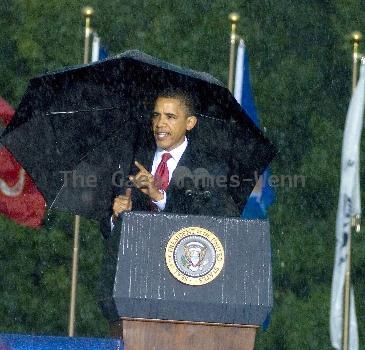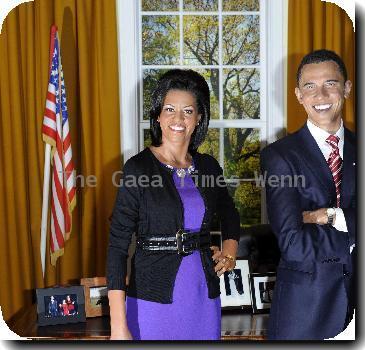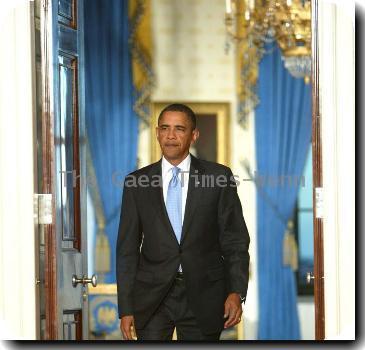Israel agrees to ease Gaza land blockade, hopes to quell international outcry over deadly raid
By Amy Teibel, APThursday, June 17, 2010
Israel agrees to ease Gaza land blockade
JERUSALEM — Israel agreed Thursday to ease its three-year-old land blockade of the Hamas-ruled Gaza Strip, hoping to quell international outrage over its deadly raid on a flotilla bound for the Palestinian territory.
In one of the major changes, Israel will allow in more desperately needed construction materials for civilian projects, provided those projects are carried out under international supervision, government and military officials said. Israel has barely allowed in goods such as cement and steel, fearing Hamas militants could use them to build weapons and fortifications. The policy has prevented rebuilding thousands of homes and other buildings damaged in Israel’s war with Hamas last year.
An Israeli military official told The Associated Press all foods would be allowed in to the impoverished territory, effective immediately. Authorities had previously allowed a short and constantly changing list of foods in, but the list has been growing incrementally in recent months.
Israel is maintaining its naval blockade intended to keep weapons shipments out of the hands of Hamas.
“This is a step in the right direction,” said Cristina Galach, spokeswoman for the European Union presidency.
However, Hamas was not satisfied.
“We want a real lifting of the siege, not window-dressing,” said Hamas lawmaker Salah Bardawil.
The easing is evidence of the intense pressure Israeli leaders felt after an international outcry over the raid on a blockade-busting flotilla on May 31. Israeli commandos killed nine pro-Palestinian activists and both sides claimed they acted in self-defense.
Israel imposed the blockade in 2007 after Hamas, which calls for Israel’s destruction, violently seized control of Gaza. For the most part, only basic humanitarian goods have been allowed in for a population of 1.5 million. Egypt has cooperated by blockading its land border with Gaza, but it opened it days after the flotilla raid to allow thousands of Palestinians to leave.
Israel’s shift came just one week after President Barack Obama, the country’s most important ally, said the blockade was unsustainable and called for scaling it back dramatically. Israel made the decision after extensive consultations with European and American officials.
“This morning, the government of Israel took decisions to liberalize the system under which civilian goods may enter the Gaza Strip, to expand materials for projects inside Gaza which are under international supervision,” government spokesman Mark Regev said.
“But of course we must remain with the security procedures that prevent the import into Gaza of weapons and war materials that strengthen the Hamas military machine,” he said, indicating the naval blockade would remain in force.
Prime Minister Benjamin Netanyahu has repeatedly warned that if the naval closure is lifted, Iranian-backed Hamas would turn Gaza into an “Iranian port.”
There was no mention of lifting or easing bans on exports from Gaza or imports of raw materials that would be crucial to galvanizing the territory’s battered economy.
The EU’s foreign policy chief, Catherine Ashton, said officials wanted to see how the Israeli decision is carried out.
“The detail is what matters,” she said. Israel must “make sure that many, many more goods can get in to Gaza to enable people to reconstruct their homes, to build schools, to place infrastructure, and also enable people to get on with ordinary lives.”
She said EU officials will discuss the possibility of helping reopen Gaza’s border crossings. The EU helped monitor Gaza’s southern border with Egypt until Hamas took power in 2007.
U.N. spokesman Chris Gunness said the blockade has prevented the United Nations from bringing in construction materials needed to carry out an internationally approved plan to rebuild thousands of homes and other buildings Israel damaged or destroyed in last year’s war in Gaza.
The closure has also shuttered hundreds of factories, put tens of thousands of people out of work and brought the territory’s fragile economy to a standstill, mainly hurting ordinary Gazans.
The blockade failed to achieve its aims of stanching the flow of weapons to Gaza, weakening Hamas or winning the release of an Israeli soldier held in captivity in Gaza for years. A network of smuggling tunnels under the Egypt-Gaza border became a conduit for both weapons and commercial goods sold at black market prices. Gazans sank deeper into poverty, turning their anger against Israel and not their Hamas rulers.
In the West Bank, the pro-Western Palestinian government of President Mahmoud Abbas which rivals Hamas also criticized the Israeli decision. Negotiator Saeb Erekat said the closure should be ended altogether.
“The siege is collective punishment and it must be lifted.”
Privately, however, Abbas’ aides have expressed concern that an opening of Gaza’s borders would strengthen Hamas at his expense.
Most Gazans remained confined to the territory. Egypt is only letting in people with special travel permits, such as students and Gazans with foreign passports. In the past two weeks, only 10,000 Gazans have crossed into Egypt.
Turkey on Thursday threatened not to send its ambassador back to Israel unless it receives an apology for the flotilla raid. Ankara, which withdrew its ambassador immediately after the raid, also wants Israel to agree to an international investigation into the raid and compensate victims, a government official said.
Israel opposes an international investigation, and has appointed its own panel of legal experts. That commission met for the first time on Wednesday.
Tags: Africa, Barack Obama, Blockades, Border Security, Egypt, Europe, Gaza, Gaza Strip, Gaza-blockade, Israel, Jerusalem, Materials, Middle East, North Africa, North America, Palestinian Territories, Territorial Disputes, Turkey, United States, Western Europe





